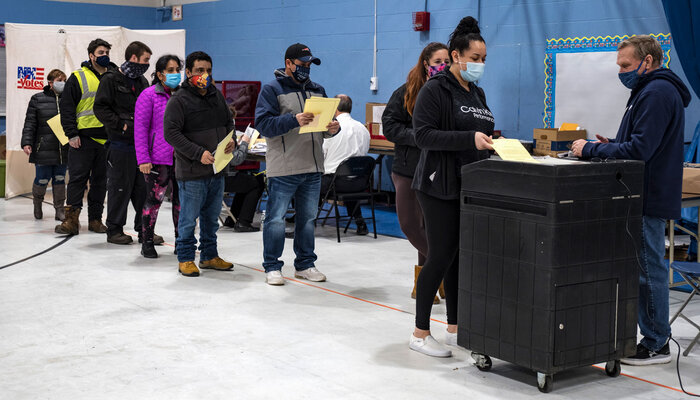2021 was, unfortunately, a banner year for new barriers to the right to vote. Nineteen states enacted thirty-four laws restricting access to voting, far and away the most in any year in at least the past decade.
These laws impose a wide range of voter suppression measures, such as obstacles to voting by mail, new voter ID requirements, and limitations on what election officials can do to help promote voter access. They vary greatly in scope, from omnibus laws with multiple restrictive provisions to single-subject laws that create less obvious burdens.
The modern approach to voter suppression can often be characterized as death by a thousand cuts — seemingly minor rules about issues like voter ID, mail voting, resource allocation at polling places, and voter roll maintenance can add up to create significant burdens, particularly on communities of color.
It is thus often difficult to understand the full impact of new restrictive voting laws when looking at any one provision by itself. And new provisions that seem less burdensome at first glance are sometimes indicative of a broader push to sabotage election outcomes that may not be as obvious.
That said, some voting laws passed in 2021 stand out as particularly concerning on their face. The substance of these laws and the processes used to enact them should raise a red flag for anyone concerned about the health of our democracy. Here are five of the most concerning examples:
Florida Senate Bill 90: Broad restrictions on mail voting
After an election where Black voters in Florida cast mail ballots at a rate higher than in recent years, Florida enacted S.B. 90, which imposes a long list of new constraints on mail voting. The law severely limits the availability and accessibility of mail ballot drop boxes and requires voters to put their state ID number or Social Security Number on their mail ballot application without providing an alternative for voters who lack such information. It also limits who can assist voters with returning their mail ballots.
Georgia S.B. 202: A ban on food and water, plus subtle attacks on mail voting and local election officials
Georgia S.B. 202 gained national attention by making it a crime to distribute water or snacks to voters waiting in line, a response to a practice many voter participation groups use in this state with notoriously long wait times in some elections. While the food and water provision is the most blatantly outlandish, the law contains less obvious aspects that pose serious threats. It allows any voter to come to a county clerk’s office and challenge the voter registrations of as many people as they would like. And, after an election when Black voters voted by mail at a rate higher than ever before, it makes it more difficult to vote by mail in several ways. The law also sets up a process that could be used to remove professional election officials and replace them with more partisan actors.
Iowa Senate File 413: Criminalizing election officials for protecting voters
Iowa helped to start a national trend of laws targeting election officials with criminal penalties for expanding voting access by enacting S.F. 413. The law imposes a number of new penalties and restrictions on election officials, including a provision that refers county election officials for criminal prosecution if they do not implement the law’s aggressive new voter-roll purge provisions.
Montana House Bill 176: Ending a popular policy for partisan reasons
Montana H.B. 176 eliminated Election Day registration, a popular and effective policy that Montana voters have relied on for years. During debate over the law, a Republican state representative openly stated that he wanted to end election day registration because he believed it was used by young people who were “not on our side of the aisle.”
Texas S.B. 1: Targeting Election Workers and Restricting Mail Voting
After a lengthy legislative process that involved the speaker of the House asking legislators not to use the word “racism” when debating on the floor, Texas passed S.B. 1, a law so restrictive that the Brennan Center is challenging it in court.
Some of its most aggressive provisions target election officials and workers and make it harder to vote by mail. The law threatens election officials and workers with new criminal penalties for expanding voter access or even simply encouraging eligible voters to request mail ballots. For mail voting, it imposes new identification number requirements and new obstacles for voter assistance. It also empowers partisan poll watchers to harass voters and election workers. The changes have already reportedly led to astounding mail ballot rejection rates in some counties.
What’s in store for 2022
State legislatures are not slowing down with their attempts to suppress the voices of certain voters. A stunning number of antidemocratic bills have already been pre-filed or introduced for 2022 legislative sessions. Here are some of the worst:
Arizona: Onerous proof of citizenship requirements
Arizona legislators have pre-filed two bills that would require voters to show proof of citizenship for all elections. Such rules have been struck down in Arizona and other states for various reasons, and they severely burden voters without doing anything to prevent fraud. Nevertheless, Arizona S.B. 1013 would require the secretary of state to ask for an exemption from the federal rules that bar proof of citizenship requirements to vote, and Arizona S.C.R. 1005 would initiate a ballot referendum to impose a new proof of citizenship requirement.
New Hampshire: Election sabotage
In New Hampshire, state legislators are jumping on the disturbing national trend of election sabotage legislation with three pre-filed bills that attack fair election administration in different ways. House Bill 1522 would allow any voter to conduct their own “citizen’s audit” of election results by personally viewing every ballot cast in an election, creating serious privacy problems and further undermining public confidence in elections. H.B. 1567 would allow any registered voter to sue to have an election official removed from office. And H.B. 1324 would allow the New Hampshire State Senate to initiate a dispute before the New Hampshire Supreme Court seeking to overturn the state’s results for a presidential election.
• • •
This legislation is dangerous to our democracy, no doubt. And there are many more provisions in the long list of restrictive voting laws passed nationwide last year that will create significant burdens on voters.







